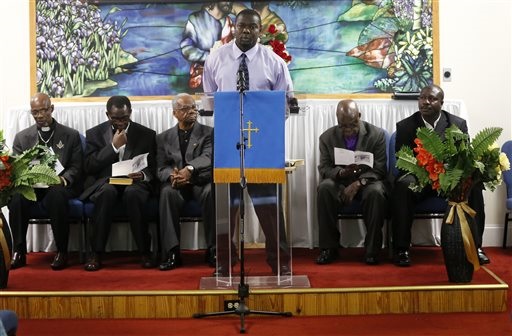First US Ebola victim remembered for compassion

Josephus Weeks, nephew of Thomas Eric Duncan, speaks during a memorial service for Duncan, Saturday, Oct. 18, 2014, in Salisbury, N.C. Duncan died of Ebola in Dallas on Oct. 8. AP
SALISBURY, North Carolina — Thomas Eric Duncan was remembered Saturday as a big-hearted and compassionate man whose virtues may have led to his infection with Ebola in his native Liberia and subsequent death as the first victim of the disease in the United States.
Family and friends gathered at a small Southern Baptist church with a primarily Liberian flock near where Duncan’s mother and other family members live.
Duncan’s neighbors in Liberia believe he was infected by helping a pregnant woman who later died from Ebola. It was unclear if he knew about her diagnosis before traveling to the United States. Duncan denied helping his Ebola-sickened neighbor, but it would be consistent with the caring nature he always showed, said his nephew Josephus Weeks of nearby Kannapolis.
“There’s no doubt in my mind that what’s described in the news is something that Eric would do,” said Weeks, who like Duncan is 42 and grew up in the same households as his uncle. “Eric would have been out there and helped that woman. And he would have done everything that he needed to do for that woman to make sure she was fine.”
Retired United Methodist bishop Arthur Kulah said Duncan attended a high school the cleric helped establish in neighboring Ivory Coast for refugees from the Liberian civil war that raged through the 1990s. To generate much-needed income, Duncan jury-rigged a telephone connection allowing fellow refugees to contact family abroad for help, Kulah said.
Article continues after this advertisement“People would go there without any money and appeal to him, and he was willing to give them time to talk to their people. There were some people who paid and some people who didn’t pay,” Kulah said. “He was such a compassionate young man, respectful young man.”
Article continues after this advertisementAbout 40 friends and family members — many women wearing colorful headscarves — gathered inside the 100-seat church and listened as speakers remembered Duncan accompanied by an electric piano and bongos. His weeping mother sat in the front row. Weeks’ 3-year-old son dabbed at the elderly woman’s teary eyes with a tissue.
Duncan left Ivory Coast and learned auto mechanics and welding at a United Nations school for refugees in Ghana, relatives said. He came to the United States hoping to work multiple jobs, save money and build a future, said his relative, Harry Korkoya of Woodbridge, Virginia.
Duncan is also survived by four children, none of whom could attend the memorial service, Weeks said. The four people living in the Dallas apartment where Duncan stayed after arriving in the United States are due to leave quarantine next week after the end of a 21-day incubation period for the disease.
“He cared for everybody, it doesn’t matter who you were. If he was driving he saw you over there, he wouldn’t splash you with dirty water. He’d pull over and let you in his car,” Weeks said.
RELATED STORY